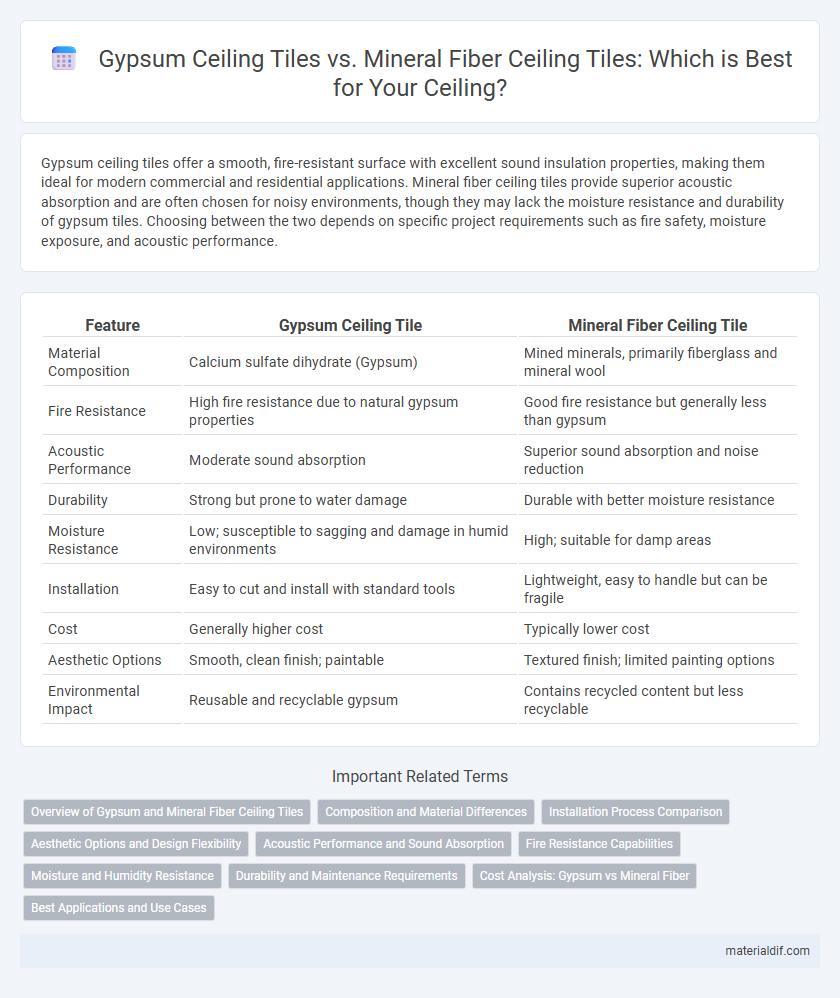Gypsum ceiling tiles offer a smooth, fire-resistant surface with excellent sound insulation properties, making them ideal for modern commercial and residential applications. Mineral fiber ceiling tiles provide superior acoustic absorption and are often chosen for noisy environments, though they may lack the moisture resistance and durability of gypsum tiles. Choosing between the two depends on specific project requirements such as fire safety, moisture exposure, and acoustic performance.
Table of Comparison
| Feature | Gypsum Ceiling Tile | Mineral Fiber Ceiling Tile |
|---|---|---|
| Material Composition | Calcium sulfate dihydrate (Gypsum) | Mined minerals, primarily fiberglass and mineral wool |
| Fire Resistance | High fire resistance due to natural gypsum properties | Good fire resistance but generally less than gypsum |
| Acoustic Performance | Moderate sound absorption | Superior sound absorption and noise reduction |
| Durability | Strong but prone to water damage | Durable with better moisture resistance |
| Moisture Resistance | Low; susceptible to sagging and damage in humid environments | High; suitable for damp areas |
| Installation | Easy to cut and install with standard tools | Lightweight, easy to handle but can be fragile |
| Cost | Generally higher cost | Typically lower cost |
| Aesthetic Options | Smooth, clean finish; paintable | Textured finish; limited painting options |
| Environmental Impact | Reusable and recyclable gypsum | Contains recycled content but less recyclable |
Overview of Gypsum and Mineral Fiber Ceiling Tiles
Gypsum ceiling tiles are made from calcium sulfate dihydrate and provide excellent fire resistance, moisture stability, and smooth aesthetic surfaces ideal for interior spaces. Mineral fiber ceiling tiles consist of porous inorganic materials like slag wool and fiberglass, offering superior sound absorption and thermal insulation properties. Both types cater to different construction needs, with gypsum favored for durability and mineral fiber for acoustic performance.
Composition and Material Differences
Gypsum ceiling tiles are primarily composed of calcium sulfate dihydrate, offering a dense and smooth surface that provides excellent fire resistance and moisture tolerance. Mineral fiber ceiling tiles consist of a blend of natural and synthetic fibers, such as fiberglass, clay, and perlite, resulting in superior acoustic absorption and lightweight properties. The distinct material compositions influence durability, installation, and environmental impact, with gypsum providing a more solid structure and mineral fiber emphasizing sound control and ease of handling.
Installation Process Comparison
Gypsum ceiling tiles offer a straightforward installation process due to their lightweight design and uniform size, allowing for quick fitting into standard grid systems without extensive tools or adhesives. Mineral fiber ceiling tiles often require careful handling to avoid damage during installation and may need additional support or adhesive application in humid environments to maintain stability. The faster installation time and reduced labor costs of gypsum tiles make them a preferred choice in commercial settings focused on efficiency.
Aesthetic Options and Design Flexibility
Gypsum ceiling tiles offer a smooth, consistent surface that can be easily painted or textured to match diverse interior design themes, providing enhanced aesthetic versatility. Mineral fiber ceiling tiles feature a more textured, porous appearance that excels in acoustic performance but limits customization in color and finish. Gypsum tiles enable greater design flexibility with crisp edges and the ability to integrate intricate patterns, making them ideal for modern and minimalist aesthetics.
Acoustic Performance and Sound Absorption
Gypsum ceiling tiles offer superior acoustic performance with higher sound absorption coefficients, effectively reducing reverberation and enhancing speech intelligibility in commercial and residential spaces. Mineral fiber ceiling tiles provide good sound absorption but often contain fibers that may degrade over time, diminishing long-term acoustic efficacy. Choosing gypsum tiles ensures consistent noise control and better compliance with acoustic standards such as NRC (Noise Reduction Coefficient) ratings.
Fire Resistance Capabilities
Gypsum ceiling tiles offer superior fire resistance due to their inherent non-combustible properties and ability to withstand high temperatures without distortion or loss of integrity. Mineral fiber ceiling tiles provide moderate fire resistance but may degrade or emit smoke when exposed to intense heat. Fire-rated gypsum ceiling tiles comply with ASTM E119 standards, ensuring enhanced safety in commercial and residential buildings.
Moisture and Humidity Resistance
Gypsum ceiling tiles exhibit superior moisture and humidity resistance compared to mineral fiber ceiling tiles, making them ideal for environments with high dampness. Gypsum's dense, non-porous structure prevents water absorption, reducing the risk of mold and deterioration under humid conditions. Mineral fiber tiles, on the other hand, are more prone to moisture retention and damage, which can compromise their structural integrity over time.
Durability and Maintenance Requirements
Gypsum ceiling tiles offer superior durability due to their resistance to sagging, moisture, and fire, making them ideal for long-term use in humid or high-traffic environments. Mineral fiber ceiling tiles, while cost-effective and providing good acoustic properties, tend to absorb moisture and are prone to sagging or damage over time, requiring more frequent replacement or maintenance. Maintenance of gypsum tiles is minimal, often limited to occasional cleaning, whereas mineral fiber tiles may need regular inspections to address potential mold growth and deterioration.
Cost Analysis: Gypsum vs Mineral Fiber
Gypsum ceiling tiles generally have a higher initial cost compared to mineral fiber tiles due to their dense composition and manufacturing process. Mineral fiber tiles tend to offer lower upfront expenses and are widely favored for budget-conscious projects without compromising acoustic performance. Long-term maintenance costs for gypsum tiles may be lower because of their durability and resistance to sagging, making them cost-effective over time despite the higher initial investment.
Best Applications and Use Cases
Gypsum ceiling tiles are ideal for environments requiring high moisture resistance and fire retardancy, such as kitchens, bathrooms, and commercial spaces with strict fire codes. Mineral fiber ceiling tiles excel in acoustic performance and sound absorption, making them suitable for offices, schools, and healthcare facilities where noise control is essential. Both materials offer easy installation and maintenance, but gypsum tiles provide a smoother finish and greater durability in damp conditions.
Gypsum ceiling tile vs Mineral fiber ceiling tile Infographic

 materialdif.com
materialdif.com